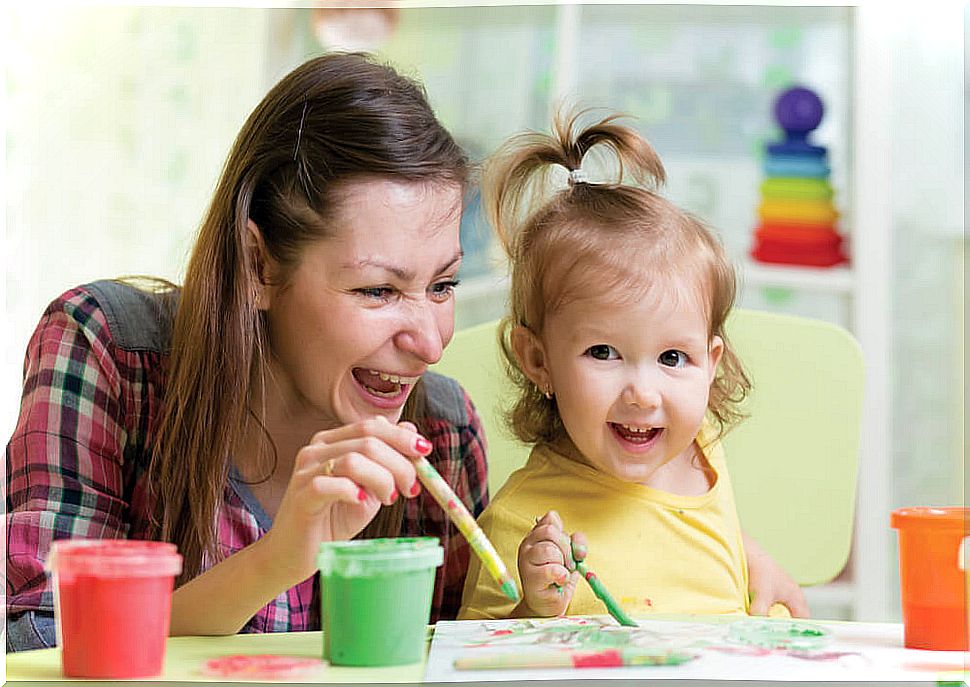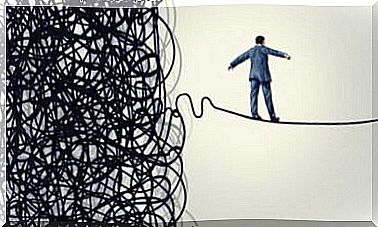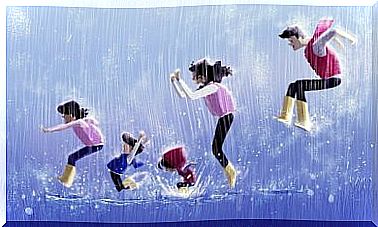Top 3 Ways To Praise Children To Keep Them Growing

Praise comes with its risks. “You are so smart!” “And so creative!” “You’re so. . . ! ” Inserting an adjective that describes our child can be, at times, convenient, and at others, harmful). Why?
When our little one performs a feat or demonstrates a social skill, such as putting on his shoes by himself, we immediately praise him for his achievement. Bravo! Our son performs a feat and we verbally reward him. This recognition often comes out of our mouths without thinking (or we omit it in the same way).
The double edge of praise
The child has verified the association action = praise and, most likely, will repeat the feat simply by the fact of being praised again.
The research is pretty clear on this: the use of praise motivates children only to receive more praise. Therefore, when that praise labels a child (for example, “you are very smart”), it is easy for the child to focus on maintaining this perception over time, instead of being interested in his performance or his process learning.
Alonso Tapia, in this sense, ensures that simply using praise “can be perceived as a form of control, so the interest in the task will decrease.” Thus, in order not to appear clumsy, you can make them stop asking questions or minimize their participation, for fear of making a mistake and looking ridiculous.
In short, if you try to reinforce a child’s behavior by telling them that they are very smart, you can stop them from displaying intrinsically motivated behaviors.
So how should we praise our children to help them build an effective motivational framework? The following three strategies can be a good answer to this question:
Praise the process, not the person
The way we praise children can affect their thinking and, in turn, their propensity to take on challenges, persevere, and succeed academically. According to published studies, there are two particular mindsets: fixed and growth.
- The children with fixed mindset believe things such as intelligence, character and creative ability are innate and immutable. In other words, no matter how hard they study or how much effort they exert, they are practically stuck with the cards they were given when they were born. And because they believe their potential is limited, they avoid challenges that test their abilities. The thoughts of these children can easily become causes of school failure or social withdrawal.
- The children with a growth mindset believe that the brain is a muscle that can grow and their skills can be improved through practice, effort and dedication. Children with a growth mindset believe that their capacities at birth are like a seed and that their growth will be highly conditioned by how they are cared for.
The difference in thinking has been demonstrated during an experiment in which 4-year-old children were asked to solve a puzzle. They were given the option of staying to work on an easy puzzle they had previously completed or trying a more challenging one.
People with a fixed mindset decided to redo the puzzle easier, thus affirming their existing capabilities. Growth-minded people wondered, Why would someone do the same puzzle again if they have the opportunity to solve a new one?
The growth-minded kids chose to tackle the toughest puzzles. In sum, children with a growth mindset were inclined to continue testing their abilities, rather than trying to gain confidence by resolving again those they had already overcome.
Do you want to cultivate a growth mindset in your child?
Try this! Instead of praising the person (for example, “You’re creative”), praise the process:
- Praise the strategy (eg “you found a really good way to do it”)
- Praise with specificity (eg, “You seem to really understand fractions”)
- Praise the effort (for example, “I can tell you’ve been practicing”)
Be realistic: don’t say “Good job!” when it is not
Another pioneer in the field, psychologist Wulf-Uwe Meyer, conducted a series of experiments with children under the age of seven, who accepted praise at face value. Then he checked how children over twelve years old, examined the words of praise to know the truth. In other words, they compared their perception of the value of their work and that of the compliment they received.
Meyer’s studies found that children who appreciated a difference between their perception and that of the teacher took the praise as a sign that the teacher thought they lacked ability and needed an extra boost. On the other hand, Meyer’s study shows that the praise was taken as more sincere when the professor also exposed some criticisms of the work they had done.
Try this:
- Be sincere. One of the biggest mistakes we can make as parents is to assume that children are not savvy enough to detect the intentions behind our praise. You might think that you are encouraging a child by praising poor performance, but it turns out that children may perceive inauthentic praise as a sign of failure. Offer authentic praise for actual accomplishments.
Stop praising completely (“Really? Yes, by the way”)
An impressive body of studies shows that praise can be downright daunting. Seminal research by Mary Budd Rowe shows a group of elementary school students, who were praised profusely by teachers, began to answer questions in a more tentative tone (“Is the answer seven?”). And when the teacher disagreed, the students deleted and withdrawn the idea that they had originally proposed.
In another study with revealing results, conducted by Joan Grusec, eight- to nine-year-olds, often praised lavishly, began to act less generously on a day-to-day basis with their peers. Each time the children heard “I am very proud of you for helping or sharing”, they showed fewer behaviors in which they helped and shared; the intensity of the collaboration impulse diminished, that is, they created the opposite effect to the desired one.
Children develop tolerance for praise ; require increasing doses. And, as soon as parents and teachers remove the praise, children may lose interest in your activity.
Once attention is withdrawn, many children stop practicing that task that had been reinforced with explicit recognition. In short, the taste for carrying out one’s own behavior or for its intrinsic consequences disappears and its appearance is conditioned by the hope of reinforcement. When this disappears, the behavior also disappears.
So if we’re going to be a little more lenient in praise, what should we do instead?
Try this:
Instead of praising, try observing and commenting. For example “You have finished painting the picture!” Such comments acknowledge effort and encourage children to take pride in their accomplishments. If your child draws a picture, gives his / her opinion, etc., do not judge what he / she observes: “Those clouds are too big!” or “Are you sure you’re going to use a lot of blue?”
We want our children to feel encouraged and motivated. We must acknowledge their triumphs because we are truly proud of them. Changing habits takes a bit of effort, but start by continuing to say “good job” to your kids, and trying to mix it up with some other forms of praise.









